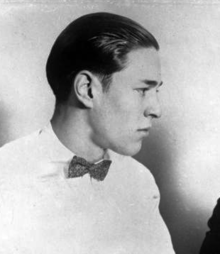Nathan Leopold | |
|---|---|
 Leopold in August 1924 | |
| Born | Nathan Freudenthal Leopold Jr. November 19, 1904 Chicago, Illinois, U.S. |
| Died | August 29, 1971 (aged 66) |
| Criminal charge | Murder, kidnapping |
| Penalty | Life + 99 years' imprisonment |
Richard Loeb | |
|---|---|
 Loeb in August 1924 | |
| Born | Richard Albert Loeb June 11, 1905 Chicago, Illinois, U.S. |
| Died | January 28, 1936 (aged 30) Joliet, Illinois, U.S. |
| Cause of death | Homicide (from 58 inflicted wounds from a razor attack) |
| Criminal charge | Murder, kidnapping |
| Penalty | Life + 99 years' imprisonment |
Nathan Freudenthal Leopold Jr. (November 19, 1904 – August 29, 1971)[1] and Richard Albert Loeb (/ˈloʊb/; June 11, 1905 – January 28, 1936), usually referred to collectively as Leopold and Loeb, were two American students at the University of Chicago who kidnapped and murdered 14-year-old Bobby Franks in Chicago, Illinois, United States, on May 21, 1924. They committed the murder – characterized at the time as "the crime of the century"[2] – hoping to demonstrate superior intellect,[3] which they believed enabled and entitled them to carry out a "perfect crime" without consequences.
After the two men were arrested, Leopold and Loeb's families retained Clarence Darrow as lead counsel for their defense. Darrow's eight-hour summation at their sentencing hearing is noted for its influential criticism of capital punishment as retributive rather than transformative justice. Both men were sentenced to life imprisonment plus 99 years. Loeb was murdered by a fellow prisoner in 1936. Leopold was released on parole in 1958. The case has since served as the inspiration for several dramatic works.
- ^ "Mocavo and Findmypast are coming together – findmypast.com". www.mocavo.com. Archived from the original on March 23, 2016. Retrieved March 7, 2014.
- ^ Homicide in Chicago 1924 Leopold & Loeb Retrieved July 18, 2015.
- ^ Lane, Brian (1995). Chronicle of 20th Century Murder. New York: Berkley Books. pp. 106–107. ISBN 978-0425146491.